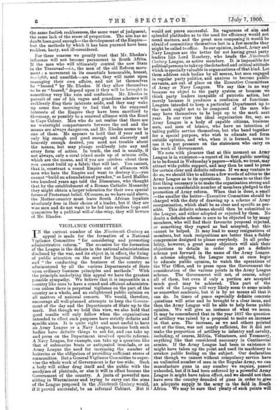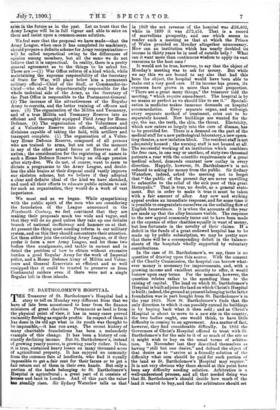VIGILANCE COMMITTEES.
TN the current number of the Nineteenth Century an appeal is made for the formation of a National Vigilance Committee " for considering and promoting administrative reform." The occasion for the formation of the League is the defects in the national administration disclosed by the war, and its object is, in effect, the fixing of public attention on the need for Imperial Defence and " the conducting the business of the country as administered by all the various Departments of State upon ordinary business principles and methods." With 1 he principle underlying this appeal we have the greatest possible sympathy. 'We believe that it is impossible in a country like ours to have a sound and efficient administra- tion unless there is perpetual vigilance on the part of the country as a whole, and an enlightened public opinion on all matters of national concern. We would, therefore, encourage all well-planned attempts to keep the Govern- ment of the day and the Departments of State up to the mark. But though we hold this view, we also hold that good results will only follow when the organisations intended to effect such purposes have strictly definite and specific aims. It is quite right and most useful to have an Army League or a Navy League, because both such bodies have definite things to ask for, and can take up and press on the Department involved specific reforms. A Navy League, for example, can take up a question like that of submarine boats or antiquated ironclads, or an Army League the need for increasing the number of batteries or the obligation of providing sufficient stores of ammunition. But a General Vigilance Cow mittee to super- vise the whole work. of Government is far too wide. Such a body will either drug itself and the public with the anodynes of platitude, or else it will in effect become the Government of the country. A junta of powerful men sitting in Westminster and trying to carry out the aims of the League proposed is the Nineteenth, Century would, if it proved successful, be an informal Cabinet. But it would not prove successful. Its vagueness of aim •and splendid platitudes as to the need for efficiency would not mend matters, and the great men composing it would be afraid of committing themselves lest in a few months they might be called to office. In our opinion, indeed, Army and Navy Leagues are the better for not having great party leaders like Lord Rosebery, who heads the Nineteenth Century League, as active members. It is impossible for political persons to take up the detached and critical attitude which is specially valuable in organisations of that kind. Let them address such bodies by all means, but men engaged in regular party politics, and anxious to become public servants, are out of place on the Executive Committees of Army or Navy Leagues. We say this in no way because we object to the party system or because we think party leaders incapable of patriotic action, but merely because it produces a confusion of functions. Leagues intended to keep a particular Department up to the mark ought not to be composed of the men who may have themselves to be kept up to the mark next year. In our view the ideal organisation for, say, an Army League is a body of capable citizens, business men, and men of leisure, who have no intention of taking public service themselves, but who band together for a special purpose, who wish to educate and form outside opinion, and who, when it is formed, mean to use it to put pressure on the statesmen who carry on the work of Government.
We note with pleasure that at this moment an Army League is in existence—a report of its first public meeting is to be found in Wednesday's papers—which, we trust, may attract wide public support, and may then be used to press for certain clear and definite reforms. If we may venture to do so, we should like to address a few words of advice to the Army League as to its operations. It seems to us that the first thing necessary is to make the organisation strong and to secure a considerable number of members pledged to the promotion of Army reform. When that is done, a small —the smaller the better—Executive Committee should be charged with the duty of drawing up a scheme of Army reorganisation, which shall be as clear and specific as pos- sible. This definite scheme should then be submitted to the League, and either adopted or rejected by them. No doubt a definite scheme is sure to be objected to by many members, who will find their favourite proposal rejected, or something they regard as bad accepted, but this cannot be helped. It may lead to many resignations of members, but such resignations are better than a flabby compromise designed to please everybody. In all proba- bility, however, a great many objectors will sink their objections to details in order to get a definite scheme put forward in the name of the Army League. A scheme adopted, the League must at once begin to educate public opinion, to watch the operations of the War Office, and to press upon the Government the consideration of the various points in the Army League scheme. The Government will not, of course, adopt all of them, but even if only a portion are accepted much good may be achieved. This part of the work of the League will very likely seem to some minds as somewhat academic, but it is by no means all that it can do. In times of peace especially definite concrete questions will arise and be brought to a clear issue, and then the Army League will be able to help focus public opinion. We will give an instance of what we mean. It may be remembered that in the year 1897 the question of artillery was raised by a proposal to make an increase in that arm. The increase, as we and others pointed out at the time, was not nearly sufficient, for it did not make the proportion of artillery to infantry and cavalry, including, of course, Militia, Volunteers, and Yeomanry, anything like that considered necessary in Continental armies. If the Army League had been in existence it might have taken up the point and used its machinery to awaken public feeling on the subject. Our declaration that though we cannot without compulsory service have an unlimited number of men in the Regular Army, we can manufacture guns in any number we require, passed unheeded, but if it had been enforced by a powerful Army League it might have taken effect, and we should not then have seen the country denuded of guns in order to give an adequate supply to the army in the field in South Africa, We may be sure that plenty of such points will arise in the future as in the past. Let us trust that the Army League will be in full vigour and able to seize on them and insist upon a common-sense solution.
We feel sure that the proposal we have made—that the Army League, when once it has completed its machinery, should prepare a definite scheme for Army reorganisation— will be called unpractical owing to the differences of opinion among members, but all the same we do not believe that it is unpractical. In reality, there is a pretty general agreement as to the things to be asked for. These are :—(1) War Office reform of a kind which, while maintaining the supreme responsibility of the Secretary of State for War, will place below him a permanent military official—Chief of the Staff, or Commander-in- Chief—who shall be departmentally responsible for the whole technical side of the Army, as the Secretary of the Post Office is responsible to the Postmaster-General. (2) The increase of the attractiveness of the Regular Army to recruits, and the better training of officers and men. (3) The organisation of the Militia and Yeomanry, and of a true Militia and Yeomanry Reserve into an efficient and thoroughly equipped Field Army for Home Defence. (4) The organisation of the Volunteers and of a Volunteer Reserve into efficient, self-contained divisions capable of taking the field, with artillery and transport complete. (5) The organisation of a Volun- tary Home Defence Reserve, composed of all persons who are trained to arms, but are not at the moment in any of the other armed forces or Reserves of the nation ; the consideration for the registering of names in such a Home Defence Reserve being an old-age pension after sixty-five. We do not, of course, want to seem to dictate a programme to the Army League, and doubt- less the able brains at their disposal could vastly improve our skeleton scheme, but we believe if they adopted a clear and definite ideal of the kind we have sketched, and used all their efforts to educate public opinion to ask for such an organisation, they would do a work of vast importance.
We must end as we began. While sympathising with the public spirit of the men who are considering the foundation of the League announced in the Nineteenth Century, we feel convinced that they are making their proposals much too wide and vague, and that they will do no good unless they take up one definite branch of national inefficiency and hammer on at that. At present the thing most needing reform is our military system, and on this they should concentrate their attention. Let them either join the existing Army Leaene, or if they prefer it form a new Army League, and .let those two bodies then amalgamate, and tackle in earnest and in detail the problem of how to obtain without excessive burden a good Regular Army for the work of Imperial police, and a Home Defence Army of Militia and Volun- teers and General Reservists so efficient and so well equipped that it could be trusted to preserve us Irons Continental raiders even if there were not a single Regular left in these islands.











































 Previous page
Previous page